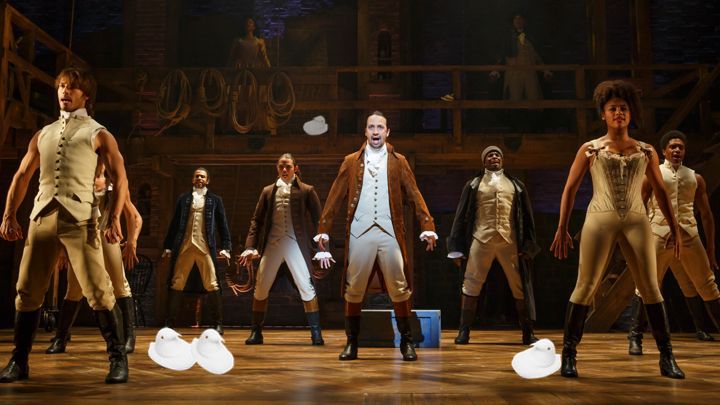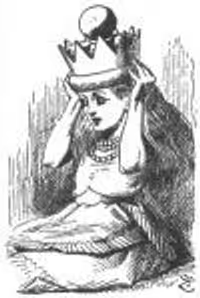Can someone tell me the reason why washington and burr and hamilton arent white?
Broadway Forever2
Leading Actor Joined: 3/7/16
#75Don't the Unions have better things to do
Posted: 4/1/16 at 3:53pm
The problem with musicals like Hamilton and rent is that they get so popular and SO many people audition. But most of the people are white. So there has to be a way you enforce the diversity of the show. Which can be complicate process. Hiring no white actors for the main roles can almost be easier.
Hamilton seems to want most or all of the primary roles played by POC and I get it once you start making one or 2 of the main characters white questions will come up of why you made certain characters white and I think it's easier to just cast POC. I don't know if they a entirely Against the idea though because I know some of the under studies are white and they have gone on stage.
I also agree that king George always being played by a gay actor is problematic but I think it's just a coincidence .
#76Don't the Unions have better things to do
Posted: 4/1/16 at 4:02pm
I have a question about the King George portrayal actually. I've never seen the show, but have heard from a couple of people (who did see it) that they were uncomfrotable with the character's physically "campy" vibe, given that he's representing the oppressor. Like I said, I haven't seen it, so I don't have my own opinion, but I'd be interested in hearing opinions on here. My question is less about whether the actor is gay and more about whether the characterization invokes gay male stereoypes.
#77Don't the Unions have better things to do
Posted: 4/1/16 at 4:08pm
Brian d'Arcy James isn't gay. As for the other 3, I have no doubt it is a coincidence,
Broadway Forever2
Leading Actor Joined: 3/7/16
#78Don't the Unions have better things to do
Posted: 4/1/16 at 4:20pm
The portrayal of King George is pretty campy and played mostly for laughs so I guess you could say it invokes stereotypes
#79Don't the Unions have better things to do
Posted: 4/1/16 at 4:26pm
I think there is no doubt that Miranda, in consistently casting a white male actor who (regardless of their personal sexuality) is directed to play the role of an oppressive King as a flamboyant buffoon is certainly as much a statement as casting the protagonists of the piece specifically with POC.
Broadway Forever2
Leading Actor Joined: 3/7/16
#80Don't the Unions have better things to do
Posted: 4/1/16 at 4:39pm
QueenAlice said: "I think there is no doubt that Miranda, in consistently casting a white male actor who (regardless of their personal sexuality) is directed to play the role of an oppressive King as a flamboyant buffoon is certainly as much a statement as casting the protagonists of the piece specifically with POC.
"
Eh like I said before in the original reading he was black so it wasn't his original vision when coming up with the character. I think it was a stylistic choice and British pop Like the Beatles is often considered "white music" lol
#81Don't the Unions have better things to do
Posted: 4/1/16 at 4:56pm
I think tha characterization of the King is less about the character being gay and more being a silly foppish sort of character, which I think is how most British people are stereotypically seen, especially wealthy men. I guess you could argue that a portrayal like that is often coded as gay, but I don't think that's the intent behind it. Personally, I think it's hysterical and isn't problematic in the least.
#82Don't the Unions have better things to do
Posted: 4/2/16 at 1:34am
That reminds me of when Minnie Driver was on Will & Grace and asked Will "Are you English?" and he replied, "No, I'm gay." She said "Well it's the same thing, really."
Dave19
Broadway Legend Joined: 12/23/11
#83Don't the Unions have better things to do
Posted: 4/2/16 at 6:40am
Broadway Forever2 said: "The problem with musicals like Hamilton and rent is that they get so popular and SO many people audition. But most of the people are white. So there has to be a way you enforce the diversity of the show. "
Wanting diversity is something else than not wanting white.
Diversity is a healthy mix. So that is not what they want. Which is fine, it's their show. But they should be open about their agenda.
#84Don't the Unions have better things to do
Posted: 4/2/16 at 6:43am
Diversity is a healthy mix. So that is not what they want. Which is fine, it's their show. But they should be open about their agenda.
Wow. Without white people, there's no diversity? That's incredibly white-centered. What if there are tons of actors of color of different races from each other? Isn't that diversity?
#85Don't the Unions have better things to do
Posted: 4/2/16 at 7:14am
It doesn't invoke gay stereotypes to me, but invokes the stereotype of the male, English/American/European aristocrat....which was genteel and dainty. Even look at the dress of men at the time: lace, brocade, knickers, heeled shoes, puffy shirts. Men of wealth separated themselves from the brutish, masculine working class on purpose.
Dave19
Broadway Legend Joined: 12/23/11
#86Don't the Unions have better things to do
Posted: 4/2/16 at 7:46am
rcwr said: "Wow. Without white people, there's no diversity? That's incredibly white-centered. What if there are tons of actors of color of different races from each other? Isn't that diversity?"
They want only POC, they don't want white. That means something else than looking for diversity. It means specifically only looking for POC.
#87Don't the Unions have better things to do
Posted: 4/2/16 at 8:58am
And yet, there ARE white peeps in the show.
#88Don't the Unions have better things to do
Posted: 4/2/16 at 10:15am
dramamama611 said: "And yet, there ARE white peeps in the show."

#89Don't the Unions have better things to do
Posted: 4/2/16 at 10:21am
There are (I believe) two white ensemble members. One of whom left the show recently, and was replaced by - I believe - another white ensemble member, which leads credence to my theory that, despite whatever they say they are looking for on the casting breakdown -- future replacements will be carbon copies of the ethnicity of the actor that created the role originally. I think they will find that is the only way that they can consistently maintain the 'diverse' cast ratio they are looking for.
#90Don't the Unions have better things to do
Posted: 4/2/16 at 10:21am
^ After reading a very heavy thread, that made me laugh hysterically. Thank you!
Broadway Legend
joined: 5/1/05
Blocked: After Eight, suestorm, david_fick, emlodik, lovebwy, Dave28282, joevitus, BorisTomashevsky, Seb28
#91Don't the Unions have better things to do
Posted: 4/2/16 at 11:39am
Hamilton is an anomaly because its casting is intended as commentary on the events of the era, and not specifically as a way to increase employment opportunities for POC. To me, the best ways to increase opportunities for POC on Broadway are 1) do more shows that feature stories about POC; and 2) acknowledge that "white face" (using the term loosely, to encompass, for example, straight-haired wigs) is VERY different from "black face," and cast POCs in roles that have traditionally been played by white people.
There is a controversy going right now about casting Zoe Saldana to play Nina Simone, because Nina Simone was discriminated against not only because she was African-American, but because she was very dark-skinned. Apparently, Zoe has to use prosthetics and makeup to look like her.
Not being a POC, I have no family stories about the beautiful mixed-race women who were chosen for performing roles while women with very dark skin were treated as ugly, even by other black people. I therefore only raise the question and do not provide any opinion on whether people of color who are light should wear makeup to play darker-skinned people, or even whether a light person should be cast for such a role at all. However, those questions are certainly looming at this moment.
Audrey
#92Don't the Unions have better things to do
Posted: 4/2/16 at 12:35pm
John Adams --- thank you.
#93Don't the Unions have better things to do
Posted: 4/2/16 at 11:22pm
The Peggy/Mariah Reynolds track was originally workshopped as a white lead, before becoming a POC track after that. No official reason was given, but I suspect that with George being an antagonist played mostly for laughs, having the "femme fatale" be white as well would turn the show into too much of an "us against them" feel. The way it stands now, Hamilton has no particularly confrontational stance other than "yeah, we are race bending history for style amd to make a point about the immigrant experience."
#94Don't the Unions have better things to do
Posted: 4/2/16 at 11:53pm
dramamama611 said: "It doesn't invoke gay stereotypes to me, but invokes the stereotype of the male, English/American/European aristocrat....which was genteel and dainty. Even look at the dress of men at the time: lace, brocade, knickers, heeled shoes, puffy shirts. Men of wealth separated themselves from the brutish, masculine working class on purpose.
"
To add to dramamama's excellent post, many of the original plays written in the early USA dealt with conflict between stereotypes of Americans v. Brits. Americans were stereotyped as rough, rude and violent. Brits were stereotyped as effete, effeminate and flamboyant. These comedies were popular on both sides of the Atlantic in the 1800s and include--IIRC--OUR AMERICAN COUSIN, the play the Lincolns were unable to finish.
Although I haven't seen the show, from everyone's description here the portrayal of Hamilton is entirely consistent with American plays during the period in which the show is set.
(ETA I should have added that the stereotype of the 18th century "fop" was not necessarily linked to homosexuality. In fact, most writers worried that an effeminate male would be a successful womanizer because his woman-like ways would appeal to and beguile the fairer sex.)
#95Don't the Unions have better things to do
Posted: 4/3/16 at 12:13am
It reminded me more than a little of Amadeus and the fop characters therein, albeit filtered through pop singer Mika.
Videos











